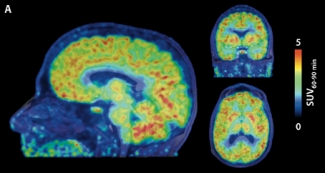A team at the Martinos Center for Biomedical Imaging at Massachusetts General Hospital (MGH) has found that a PET radiotracer they developed can reveal epigenetic activity within the human brain. The team explained in a report published in Science Translational Medicine that a specific radiochemical called Martinostat can reveal the expression levels of epigenetics-regulating enzymes in the brain.

HDACs. Red reflects the highest and blue the lowest
levels.--Courtesy of H.-Y. Wey et al., Science
Translational Medicine
Histone deacetylases (HDAC) are enzymes that regulate gene transcription. A group of these HDAC are linked to brain disorders. Many neuropsychiatric drugs are HDAC inhibitors and others are being studied for the treatment of Alzheimer’s and Huntington’s disease.
Martinostat was designed after these HDAC inhibitors and was developed in Hooker’s lab. The radiochemical can tightly bind HDAC molecules in the brain.
PET scans of 8 healthy human brains with Martinostat showed “characteristic patterns of uptake” consistent among all of the participants. The uptake reflected HDAC expression levels, which were almost twice as high in grey matter as in white matter. Uptake was highest in the hippocampus and amygdala and lowest in the putamen and cerebellum.
“Experiments with brain tissues from humans and baboons confirmed Martinostat’s binding to HDAC, and studies with neural progenitor stem cells revealed specific genes regulated by this group of HDACs, many of which are known to be important in brain health and disease,” the team explained in the announcement.
“HDAC dysregulation has been implicated in a growing number of brain diseases, so being able to study HDAC regulation both in the normal brain and through the progression of disease should help us better understand disease processes,” Hooker said in the announcement. “We’ve now started studies of patients with several neurologic or psychiatric disorders, and I believe Martinostat will help us understand the different ways these conditions are manifested and provide new insights into potential therapies.”
- here's the announcement
Related Articles:
Google backs Cambridge epigenetics spinoff in a $21M round
Merck bets up to $515M on an epigenetic project for cancer and blood disease